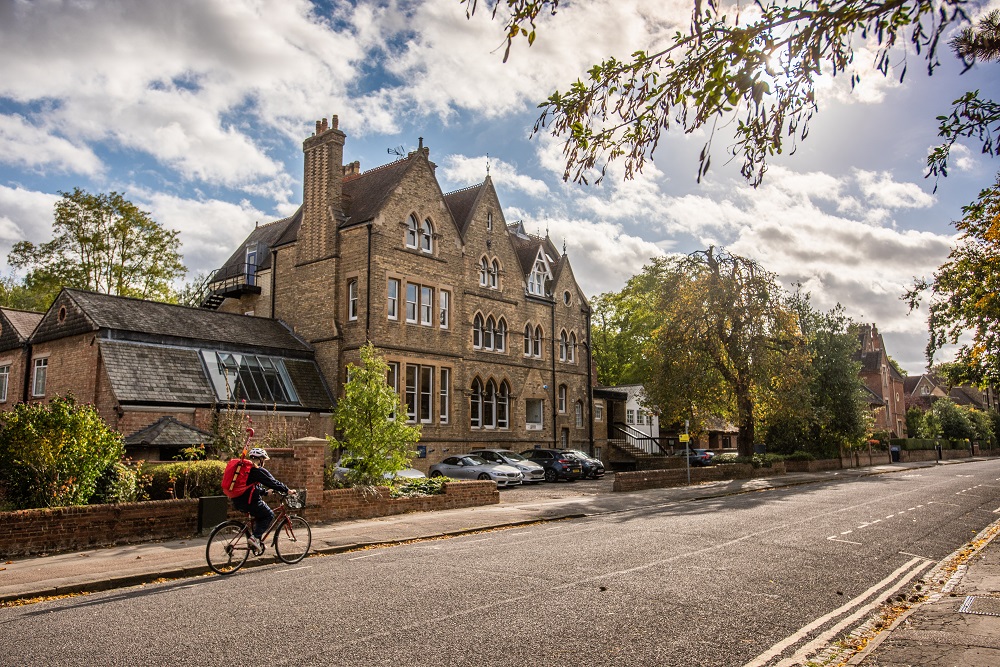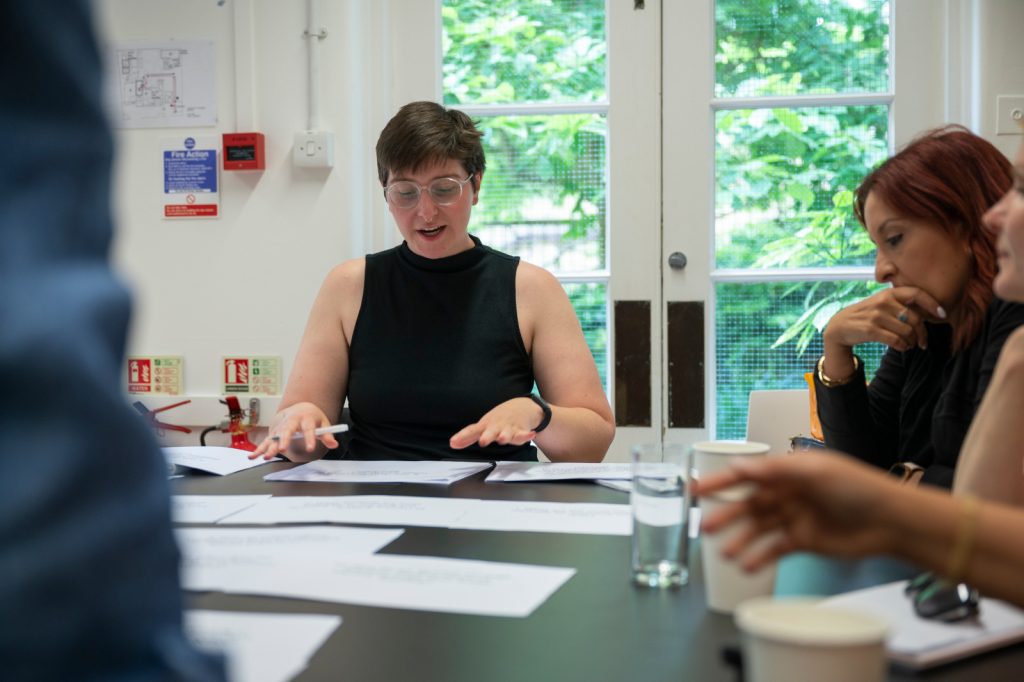Welcome
Our new part-time Postgraduate Diploma has been specifically designed for education professionals working with multilingual learners in the national and international sectors. The PGDip in English as an Additional Language (EAL) is offered on a part-time basis, taking place over three academic terms. The core aims are to promote:
- understanding of theory and research relating to language acquisition among school-aged EAL learners, and effective related pedagogy;
- a practical understanding of research-informed practice, including critically engaging with research evidence and designing and conducting classroom-based action research;
- an understanding of cross-cutting themes relevant to research-informed EAL practice;
- the application of research and theory to practice through reflection on ones’ own teaching;
- the skills of independent critical thought, rational inquiry, and self-directed learning; critical engagement with, and reflection on, current issues and debates in the field of EAL research and practice, through the lens of research and theory.
Hear from Course Director, Dr Hamish Chalmers, in this video:
The aim of the course is to ground participants in EAL research evidence to help inform policy and practice.
The course consists of three summatively assessed modules and one formatively assessed module. Across all modules, students will receive a grounding in core knowledge and skills, and cover four key themes of EAL policy and pedagogy:
- Understanding who EAL Learners are, and associated theory
- School-level policy for EAL
- Supporting classroom practice for EAL learners
- Understanding approaches to research in EAL
Residential induction week (August)

Prior to the formal start of the course, you will attend a one-week residential module in the Department of Education at Oxford. At the residential week you will meet your fellow students and course leaders. The week will help to prepare you for the coming year’s study by introducing key themes around research and evidence in EAL, exploring the principles of conducting and interpreting EAL research, introducing you to the University’s IT and library systems, and providing guidance on engaging with research literature and writing for an academic audience.
Module 1: Building the foundations of research-informed practice for EAL (Michaelmas Term)

This module will explore in depth the broader picture of EAL research and practice. You will learn about who EAL learners are, explore the types of research that help us understand the linguistic and developmental needs of EAL learners, understand the principles and patterns of multilingual development, and explore data about the relationships between English proficiency, linguistic background, and general attainment at school. You will also learn about whole school approaches to EAL, the principles underpinning EAL-aware curricula, assessing linguistic proficiency, and how families and schools can work together.
Module 2: Supporting EAL learners through research-informed practice (Hilary Term)

This module focuses on classroom practice. You will learn about pedagogical models that have been used with EAL learners, including in bilingual education, what research tells us about how to develop the skills of reading, writing, speaking, and listening, what we know about bringing learners’ first languages into the classroom, and the intersection between EAL and Special Educational Needs and Disabilities. The modules will prepare you to reflect on what has been shown to be effective in a variety of contexts and encourage you to interpret that evidence for policy and practice in your own.
Module 3: Independent study – practice-based research project (Trinity Term and the Long Vacation)

You will build on your learning in Modules 1 and 2, to plan, conduct and write up an independent study/project relating to the education of EAL learners. Supported by your academic supervisor, you will formulate a research question to be addressed through action research in your own professional context, or through a literature-based enquiry. You will conduct the study and write it up in a dissertation of between 10- and 15,000 words. The focus of your study will be unique to your professional development goals and circumstances, and will provide you with the opportunity to address real-world questions about working with multilingual learners.
Assessment

Assessment will take the form of both formative and summative assessment.
Formative assessments take place throughout the programme. During the induction week, you will be asked to write a critical review of a research paper on which you will receive feedback on style and content. In Modules 1 and 2, your module lead will provide responses to your contributions to the discussion forums and you will receive feedback on the outcomes of in-module quizzes and activities.
Summative assessments are assigned at the end of each module and will consist of a 2,500-word take home assignment for Modules 1 and 2, and one 10,000-15,000 research report based on Module 3, the independent study. All summative assessments are uploaded to the University’s submission portal.
FAQs
What should I include in my statement of purpose and how long should it be?

Your statement of purpose should tell us why you are interested in following this particular course and how you feel that you will benefit. It should include an account of your career to date and the benefits of any professional or academic learning you have undertaken. Please include your commitment to the subject, beyond the requirements of the course, and your capacity for sustained and intense work. The statement should be no more than 750 words.
Do I need to attend the residential unit and is there an additional cost?

Yes, participants are required attend the one-week residential module in August prior to the formal start of the course, which covers introduction to:
- Key themes around research and evidence in EAL
- Exploration of the principles of EAL research
- The VLE (Canvas) which you will use while taking part in the course
- The Bodleian Education Library
- Guidance on engaging with research literature and writing for an academic audience
You will also have opportunity to spend time with your fellow participants and course leaders.
The residential lasts for five days, running from Monday to Friday. Participants are expected to find and pay for their own accommodation and subsistence. Further information is provided on entry to the course.
How much time will I be expected to study?

Engagement with the learning materials on Canvas is expected to take approximately nine and a half hours per week, during term time. This includes viewing pre-recorded lectures, a mix of pre- and post-lecture readings, forum discussions, quizzes, and other activities. You will also meet with your academic supervisor for one hour twice per term to discuss your learning and plan your independent project.
How will my work on the course be supported?

You will be allocated a supervisor and be able to access the University’s VLE (Canvas) to discuss aspects of your work with other students. Other activities such as supervisory meetings will take place remotely, usually via MS Teams.
Who should I choose as my referees?

You are required to provide the details of three referees on your application form. We are looking for references from your employer, and an academic reference if possible. Please note that, as part of the University regulations, the Graduate Admissions Office is unable to release your application to us until you have provided at least two references with your application. Once we have received and considered your application we will then make a decision whether or not we wish to pursue the third if you have not already provided it.
How much will it cost to study and live in Oxford?

To find out how much it will cost to undertake your studies at the University, please visit the Fees and Living Costs webpage for details. As this is a distance degree, the only living costs in Oxford are associated with a one-week compulsory residential week at the start of the programme.
Will I have college membership?

Students following diploma courses are not affiliated with a college at the University of Oxford.
Will I take part in the matriculation ceremony?

No, students on this course do not matriculate.
Contact
Couldn’t find your answers under our FAQ section?
Please direct all enquiries to our administrative team and they will be happy to assist you.
Email: pgdip.eal@education.ox.ac.uk







